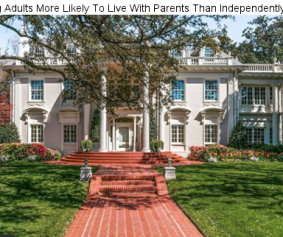A new report from the Pew Research Center this week found that American adults aged 18 to 34 were more likely to be living in their parents’ home than living with a spouse or partner in their own household. The report, based on Census Bureau data going back to 1880, concluded:
“Broad demographic shifts in marital status, educational attainment and employment have transformed the way young adults in the U.S. are living.”
According to the new report, 32.1% (almost a third) of adults aged 18-34 were living with their parents at the end of 2014, versus 31.6% who were living independently with a spouse or partner in their own household. That’s the highest percentage of 18-34 year-old Americans living with their parents on record.
But it gets worse. Another 22% were living in the home of another family member, such as a grandparent, in-law or sibling, rather than living independently in their own home or apartment. This means that over 54% of Americans aged 18-34 are living in their parents’ home, or that of another close relative, rather than living independently on their own.
The Pew report continued:
“This turn of events is fueled primarily by the dramatic drop in the share of young Americans who are choosing to settle down romantically before age 35. Dating back to 1880, the most common living arrangement among young adults has been living with a romantic partner, whether a spouse or a significant other.”
The report noted that in 1960, 62% of 18 to 34 year-olds were living with a spouse or partner in their own household rather than with parents or close relatives — the highest on record — but that percentage has steadily fallen since then.
The Pew report also found that young men are more likely to live with a parent rather than independently with a spouse or partner than were young women. But as we’ll see in the chart below, the trend toward living with parents is growing among both younger men and women alike.
So why is this happening? The sharp shift reflects a long-running decline in marriage, amplified by the economic upheavals of the Great Recession. The trend has been particularly evident among Americans who lack a college degree. Richard Fry of the Pew Research Center adds:
“We’ve simply got a lot more singles. They’re the group much more likely to live with their parents. They’re concentrating more on school, careers and less focused on forming families, spouses or partners and children,” referring mainly to Millennials.
The typical US woman now marries at 27.1 years old, up from the record low of 20.1 in 1956. The typical man now marries at age 29.2, up from the record low of 22.5 in 1956. This according to the latest data from the Census Bureau.
This shift is significantly disrupting the housing market. One mystery that has confounded analysts since the housing market began to recover in 2012 is: Why there aren’t more homes for sale? One explanation is that many Baby Boomers aren’t able to sell their family homes and downsize for retirement because they still have adult children living with them.
REDFIN, a national real estate brokerage group, recently surveyed homeowners ages 55-64 and found that one-fifth still have adult children living at home. The lack of available houses on the market has driven up prices and made it less affordable for many would-be purchasers to buy homes.
Other factors contributing to the trend of living longer with parents range from rising apartment rents to heavy student debt loads and, of course, the sluggish economy. Even though the US economy has grown modestly and the unemployment rate has dropped to 5% over the last five years, this has not led to more Millennials leaving home. That’s in large part because of a higher joblessness rate among young people, low or stagnant wages and housing costs that have risen since the 2008 recession, Pew noted.
The bottom line is that the increasing trend of young adults living longer with their parents is bad for the economy: reducing household formation, reducing the trend in home sales and reducing other consumer spending associated with household formation and home buying – just to name a few.



